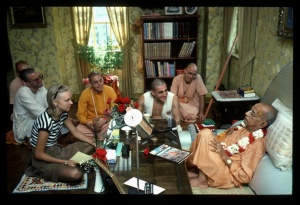SB 1.6.14

A.C. Bhaktivedanta Swami Prabhupada
TEXT 14
pariśrāntendriyātmāhaṁ
tṛṭ-parīto bubhukṣitaḥ
snātvā pītvā hrade nadyā
upaspṛṣṭo gata-śramaḥ
SYNONYMS
pariśrānta—being tired; indriya—bodily; ātmā—mentally; aham—I; tṛṭ-parītaḥ—being thirsty; bubhukṣitaḥ—and hungry; snātvā—taking a bath; pītvā—and drinking water also; hrade—in the lake; nadyāḥ—of a river; upaspṛṣṭaḥ—being in contact with; gata—got relief from; śramaḥ—tiredness.
TRANSLATION
Thus traveling, I felt tired, both bodily and mentally, and I was both thirsty and hungry. So I took a bath in a river lake and also drank water. By contacting water, I got relief from my exhaustion.
PURPORT
A traveling mendicant can meet the needs of body, namely thirst and hunger, by the gifts of nature without being a beggar at the doors of the householders. The mendicant therefore does not go to the house of a householder to beg but to enlighten him spiritually.